Youth March For Jobs
Central London. Saturday November 28, 2009
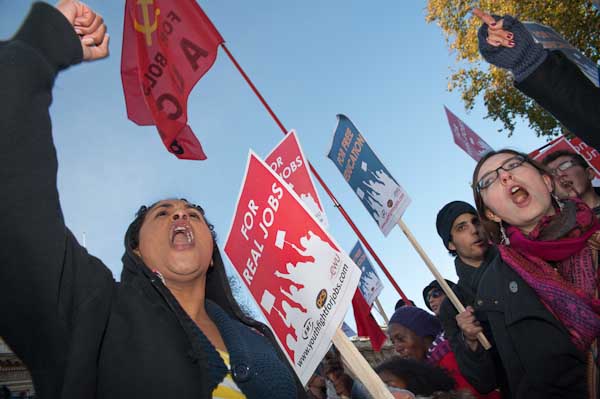 Marchers make their feelings known at Downing St
Marchers make their feelings known at Downing St
more pictures
I walked away from the
Youth March for Jobs with a Polish man of around
my age who had been watching the march as it came over Lambeth Bridge. "
These
people", he told me, "
do not understand what they are asking
for." I disagreed and we walked along the road talking. "
I
grew up under socialism, and there was no freedom. I couldn't travel, couldn't
say what I thought..." he continued. We talked some more. He told
me: "
You weren't allowed not to work; if a policeman saw you on the
street not working he would order you top go to the job centre the following
morning, and they would send you to a job." We agreed that although
we were against such compulsion, at least there was work for everyone, unlike
here.
We talked more. About how terrible it was that there were so many young people
that wanted to work, that were levaing school and university with qualifications
but could not find a job. That the system here was all determined by money
with no thought of the social consequences. That under socialism, culture
had flourished, with arts centres and music supported by the state at a local
level in a way that has never happened here, where Arts Council funding is
directed at elites.
We went our different ways before I had a chance to tell him that the free
education that these young people were demanding was something that my generation,
born after the war, had taken for granted - along with the rest of the then
new welfare state that our governments over the last 30 or more years have
been cutting back on. Coming from a background that was economically scraping
the barrel in a way perhaps hard to imagine today (but rich in some other
respects) I would never have been able to attend university unless the state
had paid for my fees and living expenses.
What we needed, we agreed before parting, was a system that combined both
the freedom of thought and action we enjoy with full employment and a state
that shows a real responsibility to support everyone, particular its poorest
members. Actually something that many of the slogans chanted on the march
were calling for.
A little under a thousand came to the start of the march outside the University
of London Union in Malet St. Some were from around London, but there were
also banners from Hull, Huddersfield, Birmingham and elsewhere. Many were
students and most but not all were young. Many of the slogans chanted as they
made their way through the crowded streets of Central London represented a
disillusion with both the Goverenment and politics generally:
Labour Cronies
Tory Snobs
Fight their cuts
Fight for jobs
but others were aimed specifically at Labour
Mandelson's a Tory
He wears a Tory Hat
And when he saw our top up fees
He said I'll double that!
Some contrasted the billions made available to rescue the failed bankers
with the stringencies being imposed on students and the poor:
Gordon Brown, stop the rot
Give us what the bankers got,
Bail out the workers
Not the bankers!
The billions wasted on ill-conceived and probably illegal wars - currently
the subject of yet another enquiry expected to state the clearly obvious -
also came in for noisy and enthusaistic criticism.
What the marchers want is the right to education rather than it becoming
a privilege for the wealthy, and for decent jobs. They oppose privatisation,
which has so often led to lower standards, replacing a pride in work and a
soical responsibility by cost-cutting, minimum standards (often not acheived)
and a loss of security for the workers with part-time working, short term
employment and loss of rights and pensions.
The march halted for a few minutes outside Downing St, where, after a speech
that only a few could hear as restictive laws prohibit the use of megaphones
in the area, a small delegation went to take a large petition to the Prime
Minister, before continuing past the Houses of Parliament. I left the marchers
as they crossed over the Thames on Lambeth Bridge on their way to their final
rally.
more pictures
London Picket for Cegielski
Polish Embassy, Portland Place, London. 27 November 2009
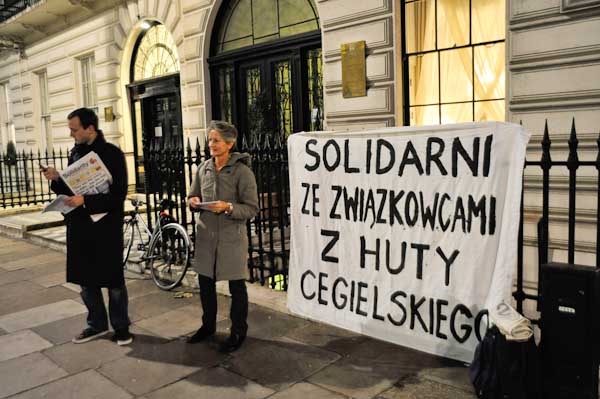 The
banner on the embassy railings
The
banner on the embassy railings
more pictures
Although the dispute at the Cegielski plant in Poznan, Poland had been settled
earlier in the week, the picket at the Polish Embassy in London organised
by the London branch of the IWW and the Polish Anarchists Society,
London went ahead with around a dozen activists displaying a banner on the
embassy railings and leafleting.
At a protest there a few days earlier, a letter was delivered to the ambassador
from the British Isles Regional Organising Committee of the Industrial
Workers of the World which has a formal solidarity alliance with the
Workers' Initiative trade union in Poland.
At 5.30pm on Friday, when the picket started, there were only a few people
inside the embassy and the main doors were locked. But the protest was noticed,
and at one point a man, probably a caretaker, opened a window and came out
on to the balcony and spoke to the demonstrators, telling them to go away.
Cegielski in Poznan, Poland, was one of the largest factories in the country.
Founded over 160 years ago and now state-owned, it produces engines of various
types and sizes, from large marine engines down to small two-strokes. At its
peak in the 70s it employed more than 20,000 but the workforce is now around
2800.
Ince 2002, Workers' Initiative (Inicjatywa Pracownicza – IP)
has been organising in the plant, gaining widespread support among the workers
as the traditional trade unions proved ineffective.
Since 2007, the workers in the IP have taken a number of wildcat actions
by assembling during working hours in a factory yard and demanding to speak
to the management; these "pyta" have lasted from around
20 minutes to three hours. They have also taken advantage of the Polish labour
Code which allows employees to take 4 days leave on demand simply by informing
the employer on the first day of absence to hold "absence strikes"
in which around 90% of the workers took part.
These actions have led to significant wage increases for the workers, but
one of the key activists, Marcel Szary, a former Solidarity plant leader,
a founder of IP, and the elected workforce representative at the plant was
found guilty of organising wildcat strikes and fined.
In October 2009, five IP stewards were sacked at Cegielski shortly after
informing the employer that they had sufficient support among the workers
to rrepresent them and claim protection for the representatives under the
Union laws. The IP had started a dispute to save jobs and demand payment of
unpaid wages and severance payments.
On Wednesday 25 November an agreement was signed by IP and the employers
which ended the dispute. The five sacked stewards were re-instated and recognized
under the law. The management also agreed not to make further redundancies,
to pay workers for stoppage time in accordance with the Labour Code, and not
to reduce wages during this year. In return the IP agreed to suspend protests.
more pictures
Christmas Decorations
West End, London. November 27 2009
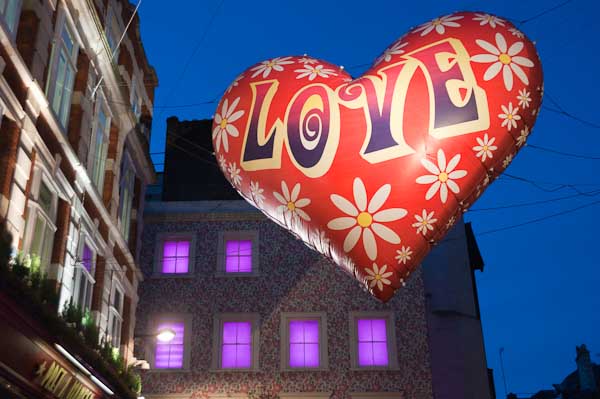
Love in Carnaby St (and underneath was sex.)
more pictures
Bill Rowlinson Remembered
Photofusion, Brixton, London. Thursday 26 November 2009
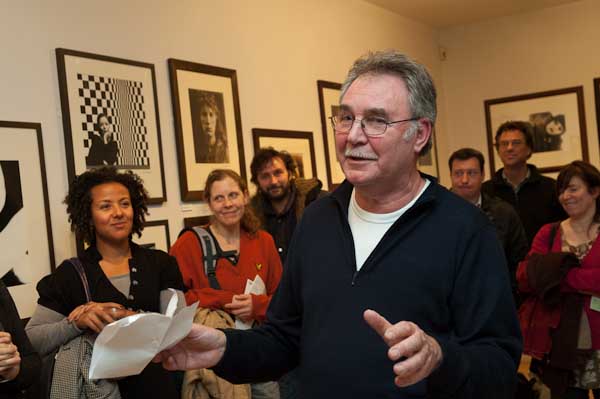
Adrian Ensor talks about Bill Rowlinson at Photofusion
more pictures
When Bill Rowlinson, aguably the
greatest of the master photographic printers working in London in the last
third of the twentieth century, died last year he left his print collection
to Photofusion in Brixton.
Although there are still some fine printers around (and many of them were
in the room for the opening), the shift to digital has really put an end to
the era darkroom wizardry, and as well as celebrating the work of Rowlinson,
Photofusion is also showing Richard Nicholson’s ‘Last
One Out, Please Turn On The Light‘ a set of highly detailed large
colour prints of the darkrooms of London's professional printers, started
in 2006.
more pictures
Die-in for Afghanistan
Parliament Square, London. 25 November 2009
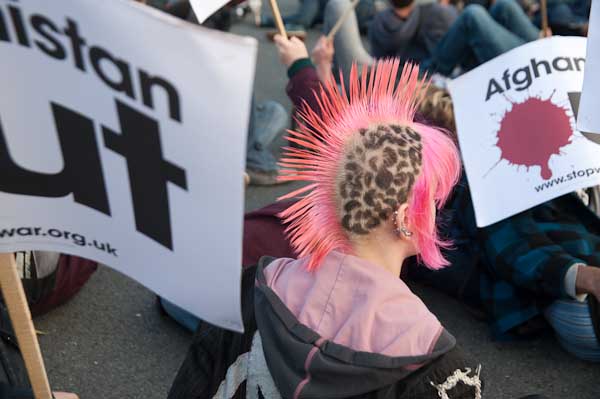
Almost certainly the most photographed of those taking part
more pictures
Demonstrators, mainly students, stopped traffic in Parliament Square, London
yesterday, Wednesday 25 November 2009, when they staged a 'die-in' on the
road in front of the Houses of Parliament. They called for an end to the war
in Afghanistan and for British troops to be brought home now.
The demonstration was a part of the Afghanistan day of action called by Stop
the War, and comes at a time of increasing public concern over the war,
with a recent opinion poll showing over 70% of the UK population in support
of a phased withdrawal of troops within a year.
Around 50 people with placards moved onto the roadway where they lay down,
chanting slogans against the war for more than ten minutes, while police stood
and watched from a distance, stopping traffic from bearing down on them. The
protesters then got up and marched around the square, where one or two impatient
drivers actually drove into some of the protesters and the media covering
the event, but fortunately there were no casualties.
The protesters then marched up Whitehall to the gates of Downing Street,
now protected by a small fence a little in front of them. There was a further
noisy demonstration there, with several short speeches, as police looked on,
forming a line to protect the fence, which lasted around five minutes.
As the protest finished, a police inspector came to warn the students that
their peaceful protest was breaking the law, which prohibits protests on the
pavement in front of the gates to Downing St, as well as the use of megaphones
in the whole Westminster area.
more pictures
One Law For All - No Sharia in UK
Marble Arch, London 21 November 2009
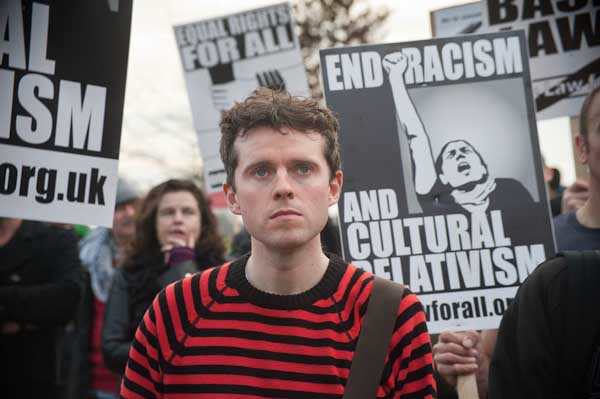
End Racism and Cultural Relativism
more pictures
Several hundred people attended a '
One Law For All' rally in London
to voice their opposition to Sharia law and other religion-based law being used
in this country and to protest at the human rights abuses being perpetrated
in various countries around the world in the name of Sharia law.
Although the One Law For All campaign concentrates on Sharia because
of the atrocities that are occurring in countries Including Iran, Iraq, Afghanistan,
Pakistan and Somalia, as well as the unjust unequal treatment of women by
tribunals in this country and elsewhere, it has a much wider remit, being
against all religious-based law. A number of the speakers denounced the special
position given to the Church of England and Christianity in UK law, and one
of them, Peter Tatchell noted that he was one of very few people
in living memory to have a conviction under the Ecclesiastical Courts
Jurisdiction Act 1860 following his Easter demonstration in Canterbury
Cathedral (found guilty, he was fined £18.60 by a judge with a sense
of humour.)
The campaign is also opposed to the Beth Din acting as an arbitration
tribunal in civil cases, stressing that secular law is a vital safeguard fro
human rights and in particular the rights of women and children.
The event was held to mark Universal Children’s Day and International
Day for the Elimination of Violence against Women. A row of small coffins
along the base of the main banner and a display of photographs reminded us
particularly of the abuses against women and children, as did a number of
the speakers and the performances by several women poets.
The UK Government was attacked for its support of cultural relativism in
allowing the setting up of organisations that deny the principles of equality
and human rights. In particular it was criticised for its reliance on "community
leaders" which gives particular importance to the views of religious
organisations.
Among the speakers were a number of ex-Muslims and representatives from human
rights organisations, secularists and humanists from Iraq and Iran. UK organisations
represented included the National Secular Society and British
Humanist Association. Liberal Democrat MP Evan Harris, philosopher
AC Grayling, and activists Muriel Seltman, Rahila Gupta
(of Southall Black Sisters) and Peter Tatchell also spoke, along
with lawyers, writers and others, and David Fisher sang several of
his songs.
One Law For All is careful to distance itself from the various right-wing
anti-Muslim groups and Maryam Namazie, the main speaker for the organisation
has consistently opposed groups such as the English Defence League. There
were just one small group of protesters at the event with a St George flag
present for a part of the demonstration.
Two Muslim men came along at one point, and one of them started debating
with some of the audience on the edge of the event. After a few minutes of
argument, two policemen who were watching came over and suggested they should
leave, then escorted them a few yards away. The police talked to them for
a few minutes, and took down their details after which they were allowed to
walk away.
more pictures
Virtual Paris - 2
Paris, July-August 1984
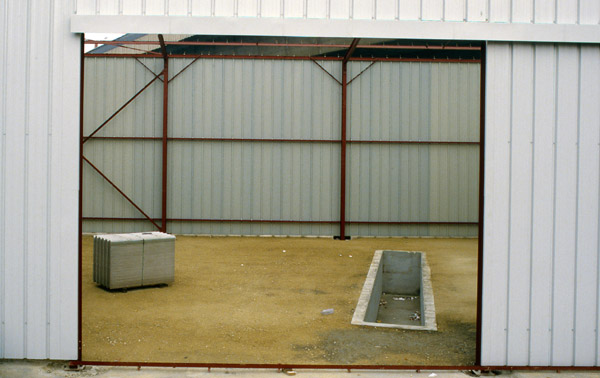
Getting away from the traditional image of Paris!
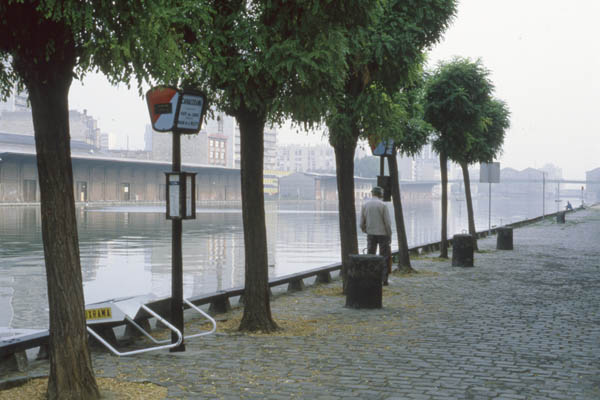
Which is rather more like this
more pictures
In 1984 I returned to the city, spending two weeks and working mainly in
black and white on a project based around Atget. But I also took some colour
transparencies, and have now put 45 of these on the web. You can read more
about that visit on >Re:PHOTO
too. I've scanned several hundred of the black and white pictures and when
time allows I'll re-edit and put that work - 'Paris Revisted : a homage
to Atget' on line also.
more pictures
Virtual Paris - 1
Paris, August 1973
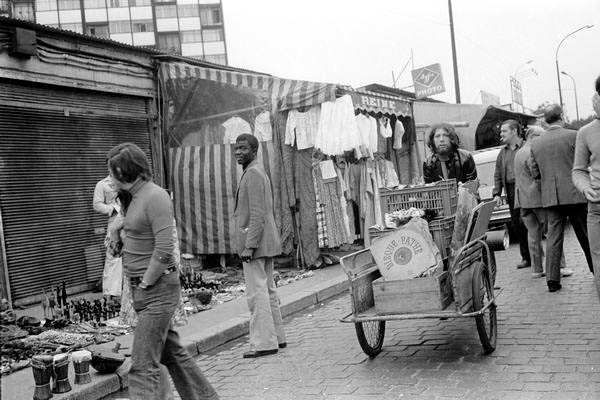
Flea market, Paris, 1973
more pictures
Since I'd decided not to go to Paris Photo this year, I spent the time recovering
from flu and making a virtual visit to the city, looking through my old negatives
and enlarging a small site I started a while ago. I started with some black
and white work from a fortnight spent staying at a student hostel in the centre
of Paris in 1973, some of which shortly afterwards was featured in my first
published magazine portfolio. You can read more about this on >Re:PHOTO
and see more pictures here, where
there are two pages of thumbnails linking to larger images. I also wrote about
and showed a few colour images
from the same year, as well as one from my first visit when I dropped my camera
in a lake!
more pictures
top of page
All pictures on this section of the site are Copyright ©
Peter Marshall 2009; to buy prints or for permission to reproduce pictures
or to comment on this site, or for any other questions, contact
me.










